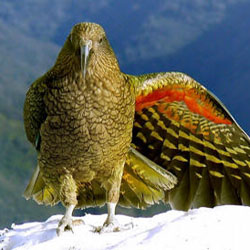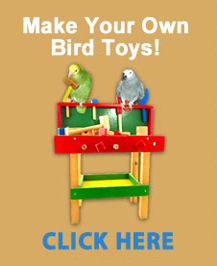How to Keep Your Exotic Bird Healthy, Safe and Warm this Winter
 The winter months are upon us and they present some unique challenges when it comes to keeping our birds healthy and safe. The colder temperatures, lower humidity and shorter days of winter can all negatively impact our bird's health.
The winter months are upon us and they present some unique challenges when it comes to keeping our birds healthy and safe. The colder temperatures, lower humidity and shorter days of winter can all negatively impact our bird's health.
Fortunately, although most exotic birds come from warm tropical climates, healthy birds are very capable of adapting to the cooler temperatures we experience in winter. Sudden changes in temperature and drafts are more dangerous than a bird's gradual acclimation to cooler temperatures.
Feathers are a bird's built-in insulators and are the key to their ability to regulate body temperature. Contour feathers overlap like shingles to hold nature's elements at bay and a bird's downy feathers trap air and heat close to their body. Birds who are pluckers are extremely challenged when it comes to regulating their body temperature so extra care must be taken to ensure their environment is controlled. Exposure to extreme temperatures can stress a bird's immune system and make them more susceptible to illness.
Winter also presents the challenge of low humidity, especially in homes with forced air heating systems. Low humidity can lead to dry nasal and breathing passages as well as an increase in dust and dander in the home environment.
As caring bird owners there are several things we can do to ensure our birds remain healthy, safe and comfortable throughout the winter months:
1) Reduce your bird's exposure to drafts by insulating your windows and relocating your bird's cages away from windows, doors and heating ducts.
2) Utilize a cage cover or well fitting blanket over the cage at bedtime.
3) In the wild, many birds will roost in flocks in part to share body heat. Pet birds often enjoy the opportunity to climb into a snuggly tent for shelter and warmth.
4) Birds lose a lot of body heat through their feet. Thermal perches are available to keep your bird's feet comfortably warm.
5) Use a bird safe space heater to keep your bird room warm. Be sure to avoid using fuel burning heaters due to the potential for fire as well as heaters with toxic Teflon coatings.
6) Bird safe heat lamps are a great way to focus heat on your bird's cage but be sure to keep them out of your bird's reach.
7) Fireplaces can pose a smoke hazard which is especially dangerous for a bird's very sensitive respiratory system. Never leave fires unattended and utilize smoke detectors in your house.
8) To combat the effect of lower humidity we suggest you utilize a humidifier and give your bird daily misting baths or showers each morning so that they have the warmth of the day to dry.
9) Daylight hours are much shorter in the winter months and this has an impact on the biological cycles of our birds. We recommend using full spectrum lighting in your bird room to maintain and promote your bird's health.
10) In the winter we typically keep all of our doors and windows shut which means our houses are poorly ventilated. As a result fumes from cleaners, candles and body care products have no where to go. Be sure to limit the use of unnecessary chemicals and choose only bird safe cleaners and candles for use in your house.







Comments powered by CComment